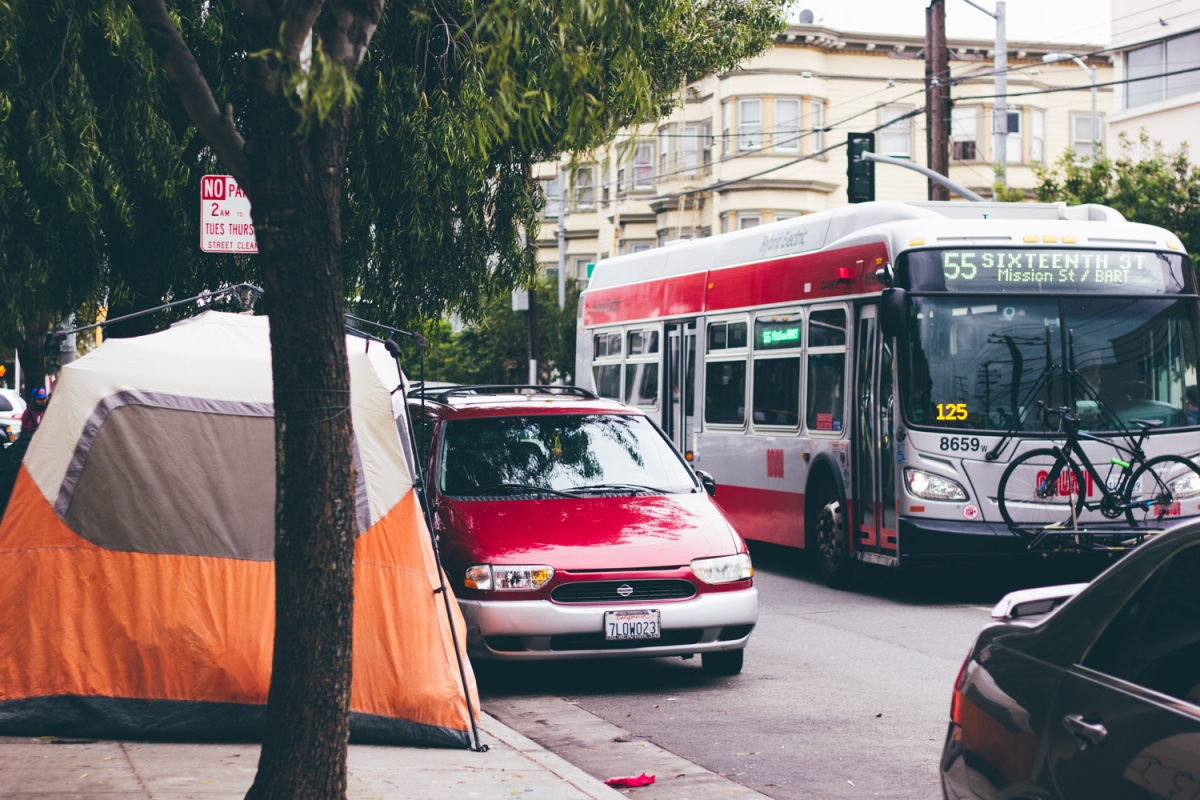
This Charter amendment would lock City Hall into annual spending on services for homeless people, and on public transit maintenance and upgrades.
The Board of Supervisors voted 8-3 to put this initiative on the ballot. Voting for: John Avalos, President London Breed, David Campos, Malia Cohen, Mark Farrell, Eric Mar, Katy Tang and Scott Wiener. Voting against: Jane Kim, Aaron Peskin and Norman Yee.
Proposition J is linked to Proposition K, which asks voters to raise the city sales tax to 9.25 percent.
Why is this on the ballot?
The ballot measure’s official proponents call homelessness and transportation “two of our City’s most important challenges.”
 |
| Photo by Nadia Mishkin / San Francisco Public Press |
The official opponent argues that locking in, and increasing, spending would not enable City Hall to surmount those challenges because they persist to this day “despite billions of dollars in expenditures.” The official opponent criticizes the city’s spending choices, such as using “$600 million of state/local matching funds” for the Central Subway project while “eliminating bus lines, shortening routes, cutting night/weekend hours and frequency.”
What would it do and at what cost?
If passed, this ballot measure would create a Homeless Housing and Services Fund and a Transportation Improvement Fund. Both would exist until July 2041.
Both would siphon set annual amounts out of San Francisco’s general fund and use that money for specific purposes.
The Homeless Services Fund would spend $50 million annually on programs to prevent homelessness and help people transition into stable homes.
Though Proposition J does not require that the $50 million be spent on the following purposes, the official proponent argument says that the money would go toward:
- Moving more than 4,000 people into housing and shelter.
- Building at least two “Navigation Centers” — 24-hour facilities where groups of homeless people are often admitted together and receive tailored assistance to permanently leave the streets.
The Transportation and Improvement Fund would spend $101.6 million annually on six targets, in the following proportions:
- 32.9 percent — Repairing and resurfacing city streets.
- 18.8 percent — Maintaining facilities’ escalators and elevators, as well as buying new vehicles and keeping the aging fleet of vehicles running; this money could also be used to offset Muni’s budget, to prevent service reductions.
- 14.1 percent — Increasing the capacity and reliability of BART, Caltrain and any other regional transit systems.
- 12.4 percent — Making Muni more usable for seniors, low- and moderate-income youths, as well as for communities that are characteristically low-income or are highly dependent on public transit.
- 12.4 percent — Improving infrastructure to help accomplish Vision Zero, the city’s goal of reducing traffic deaths to zero by the year 2024.
- 9.4 percent — Enhancing and expanding current transit routes.
(These proportions could shift if new funding became available for some of the targets, or if the Board of Supervisors chose to reapportion spending at a later date.)
The creation of the Transportation Improvement Fund and the Homeless Housing and Services Fund would cost the city an additional $152 million annually. This would be a giant — and risky — undertaking if the city did not simultaneously create a revenue stream to pay for these programs, especially if voters do not approve boosting the sales tax.
If approved, Proposition J would require the city to shift $12.5 million into the new homeless fund for the current fiscal year, which will end June 30. For the new transportation fund, the city would need to come up with $25.4 million for this fiscal year.
Is there a catch?
The money to pay for these transportation and homelessness targets would be set aside from the city’s general fund, which is used for a bevy of other purposes.
Proposition J appears to lean heavily on the simultaneous passage of Proposition K, which would create a new revenue source and add about $155 million annually to the city coffers. Those earnings would, according to projections, cover all costs that Proposition J would generate.
The language of Proposition J gives the mayor until this Dec. 31 to cancel the creation of either the Transportation Improvement Fund or the Homeless Housing and Services Fund, or both — even if voters approved this ballot measure. Presumably, if voters declined to create the new sales tax by voting down Proposition K, the mayor would have greater reason to abandon part or all of Proposition J.
In addition, the city controller says the proposition is “not in compliance with a non-binding, voter-adopted city policy” that “seeks to limit set-asides which reduce General Fund dollars that could otherwise be allocated by the Mayor and the Board of Supervisors in the annual budget process.”
Who officially proposed it?
Mayor Ed Lee and supervisors Scott Wiener and Mark Farrell. They also proposed the sales-tax increase, Proposition K.
Who officially opposes it?
The nonprofit Save MUNI.
Vote threshold to pass
Simple majority — 50 percent plus one
Effective date if passed
Current fiscal year, which ends next June 30, unless the mayor kills one or both funds by this Dec. 31.
Follow the money
One committee is spending money in support of Proposition J: “Mayor Ed Lee for San Francisco Committee, Yes on J and K.”
Follow the money at the San Francisco Ethics Commission: all Proposition J filings.
Endorsements: our methodology
The Public Press chose to count endorsements from organizations that backed multiple candidates or ballot measures, and that made those endorsements available online. We did not count endorsements from individuals.
If you think we missed an important organization, please tell us. We’d love to hear from you.
Tracked endorsements by organization
Written by: Noah Arroyo
Published: Sept. 30, 2016






